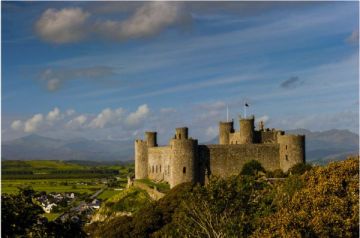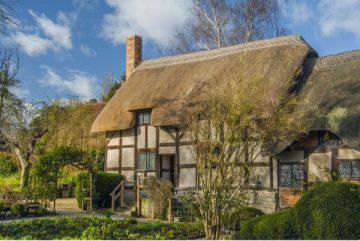CONTENT
1. Great British Web Sites
2. UK Villages Guide
3. Interview with a thatcher
4. Travel news and tips
Welcome friends, its time to put the kettle on, settle into a comfortable armchair, and enjoy the best of Britain with Britain Update. But before you do, please take the time to forward this newsletter to someone who loves Britain as much as you do.
David Ross, Publisher
********************
Great British Web Sites
********************
Harrods is online at last! That bastion of London shopping tradition, Harrod's of Knightsbridge, has joined the Internet generation at last. Harrod's new website at http://www.harrods.com gives users a peek into the store behind the famous green and gold shopping bag. The word for this site is classy, not flashy. If you're like me, you'll enjoy browsing the online catalogue just to catch a whiff of Harrod tradition and elegance. Unfortunately, items in the catalogue can only be shipped to North American addresses, an odd restriction given Harrod's popularity in its native land.
*********************
New at Britain Express
*********************
I'm pleased to announce that our new UK Villages Guide is online at /villages Villages Editor Barbara Ballard has profiled 8 of the most beautiful and historic villages in England, Scotland, and Wales, with plenty of background details, how to get there, what to see, and where to stay. We'll be adding more villages in the coming months, with user feedback and suggestions. Which village is your favourite?
******************************
Interview with a Thatcher
******************************
[ I had the pleasure of interviewing Leo Wood a few weeks ago. Leo is a charming chap who follows that most "British" of occupations, thatching. Here's the beginning of that interview. ]
Leo Wood lives in Welford, Northamptonshire and makes his living as a self-employed thatcher. He didn't plan a life working with this traditional craft. "From school I intended to follow in my father's footsteps as a chemical engineer but preferred working outdoors. I was helping a friend whose farmer father was ill with odd jobs weekends on the farm and working in the laboratory of a chrome plating plant full time.
I had no real intention of changing my job, but by chance while helping on the farm a government agricultural employment agent came to try to arrange for a full time worker on the farm. He literally dropped his paper work and one of the cards was from a thatcher looking for an apprentice." That was the beginning of Leo's career as a thatcher.
"When I started in 1963 around 200 full time thatchers were left, this is now around 2000 and has been so for five or six years" So what's the most common comment Leo gets from people who see him thatching? "Easy, and bound to raise a laugh among thatchers; we all get it.... Tap on the ladder........ 'Not many of you blokes around these days' . . .
"The basic technique of thatching apart from better fastening methods have remained unchanged for hundreds of years and probably thousands. No matter what the material the thick cut end of the bundle is the only part seen outside....."
Read the full interview at
/History/thatching-interview.htm
******************************
UK Travel Tips
******************************
SHAKESPEARE EXHIBIT OPENS
Along the route of the Millennium Mile is the world's largest exhibition dedicated to William Shakespeare. It has recently opened directly beneath the playwright's reconstructed Globe Theatre. The new attraction, "All the World's a Stage", brings to life every aspect of Shakespeare's work by using a combination of modern technology and traditional crafts. As well as costumes and design sketches, musical instruments and manuscripts, there is a section putting the Globe in the context of its surroundings: 16th-century Bankside was a notorious area of brothels, jails, drinking dens and bear-baiting pits.
Touch-screens show the special effects used in Elizabethan theatre - everything from disembodied heads to death by hanging! There is 'Shakespeare karaoke' where you can record yourself playing a part in Twelfth Night or Macbeth; or adapt your own extract from Hamlet using iMac computers. Walk into a re-created backstage workshop illustrating the crafts used to create costumes, props and scenery and learn how many of Shakespeare's phrases have passed into everyday use.
A tour of the replica Globe Theatre is included in the admission price, £7.50 adult, £5.00 child. The theatre, beside the River Thames at Bankside, London SE1, is open daily. There is a shop, cafe and restaurant. Shakespeare's Globe Theatre's season of plays runs from May 12 - Sept 24.
For more information visit:
http://www.shakespeares-globe.org.
GET A UK MAP FOR FREE
Here's a great tool if you're planning a walking or cycling holiday in the UK: Ordnance Survey now offer free Maps of Britain on the Internet. The maps can be searched by place names, postcodes and National Grid References.
The new "Get-a-map" service is a major initiative by Britain's national mapping agency and can be found on Ordnance Survey's web site at http://www.ordsvy.gov.uk. When Searching Get-a-map, users can zoom in and out from regional maps to local areas, move north, south, east and west to centre the map on a particular locality, and locate a place by typing in a postcode, place name or Ordnance Survey National Grid reference. Although the maps used are published at up to 1:250,000 scale, the zoom facility of Get-a-map allows users to enlarge extracts to 1:70,000 or even 1:35,000 scale on screen, meaning that smaller areas appear much clearer to the viewer. Whatever scale is chosen, the required location is highlighted by a clear red circle. Users can save this image and, if they have appropriate drawing software on their machine, they can add to the map. This is the ideal tool to plan your walking routes before you leave home.
NEW CENTRE ON HADRIAN'S ROMAN WALL
Segedunum opens at the eastern end of Hadrian's Wall on June 17, giving visitors a glimpse of what life - and bathing - was like in a Roman fort nearly 2,000 years ago. The great wall stretched 73 miles across northern England, and was built on the order of the Emperor Hadrian, who came to Britain in 122 AD: Segedunum (it means 'strong fort') was the most easterly of 17 forts along the wall, and was occupied for nearly 300 years.
Segedunum, in Buddle Street, Wallsend - to the east of Newcastle upon Tyne, 280 miles north of London - is a £9 million attraction, with the ruins of one of the most completely excavated forts in the Roman empire. It has an exact replica of a working Roman bath house, decorated with frescoes based on wall paintings at Pompeii, and from surviving villas in Britain. Visitors enter a changing room, then progress through a series of cold, warm and hot rooms - a coal-fired furnace heats the air, which is channelled under the floor. Groups will be able to book an authentic evening bathing experience.
The site also has a 35-metre tower for viewing the fort; a gallery with excavated finds and computer interactive displays of everyday Roman life; on-going archaeological excavations; a 50-seat auditorium with films on the history of the area; a cafeteria and a shop. It will be open daily, admission £2.95 adults £1.95 concessions and children, £8.50 family ticket.
That's all for now. Until next issue, let me remind you that laughter is contagious. Be a carrier.
David Ross, Publisher, Britain Express



